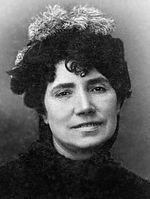Rosalía de Castro, Date of Birth, Place of Birth, Date of Death
TweetRosalía de Castro
Spanish Galician poet, writerAbout Rosalía de Castro
- María Rosalía Rita de Castro (Galician pronunciation: [rosa'li.? ð? 'kast??]; 24 February 1837 – 15 July 1885), was a Galician romanticist writer and poet. Writing in Galego, the Galician language, after the period known as the Séculos Escuros (lit.
- Dark Centuries), she became an important figure of the Galician Romantic movement, known today as the Rexurdimento ("Renaissance"), along with Manuel Curros Enríquez and Eduardo Pondal.
- Her poetry is marked by saudade, an almost ineffable combination of nostalgia, longing and melancholy. She married Manuel Murguía, a member of the important literary group known as the Royal Galician Academy, historian, journalist and editor of Rosalía's books.
- The couple had seven children: Alexandra (1859–1937), Aura (1868–1942), twins Gala (1871–1964) and Ovidio (1871–1900), Amara (1873–1921), Adriano (1875–1876) and Valentina (stillborn, 1877).
- Only two of Rosalía's children married, Aura in 1897 and Gala in 1922; neither they nor their siblings left any children, and thus, today there are no living descendants of Rosalía de Castro and her husband.
- Their son Ovidio was a promising painter, his career cut short by early death. Rosalía published her first collection of poetry in Galician, Cantares gallegos ("Galician Songs"), on 17 May 1863.
- This date, 17 May, is now known as the Día das Letras Galegas ("Galician Literature Day"), and commemorates Rosalía's achievement by dedicating, every year, this special day to a different writer, who must also write in the Galician language, since 1963.
- Día das Letras Galegas is an official holiday in the Autonomous Community of Galicia. Relative poverty and sadness marked Rosalía's life, in spite of this, she had a strong sense of commitment to the poor and to the defenseless.
- She was a strong opponent of authoritative abuse or abuse of authority and an ardent defender of women's rights.
- Rosalía suffered from uterine cancer and died in Padrón, province of A Coruña, Spain, on 15 July 1885. She is buried in the Panteón de Galegos Ilustres, a pantheon (mausoleum) in the Convent of San Domingos de Bonaval in Santiago de Compostela, Spain.
Read more at Wikipedia


 Date of Birth:
Date of Birth:  Place of Birth: Santiago de Compostela, Galicia, Spain
Place of Birth: Santiago de Compostela, Galicia, Spain